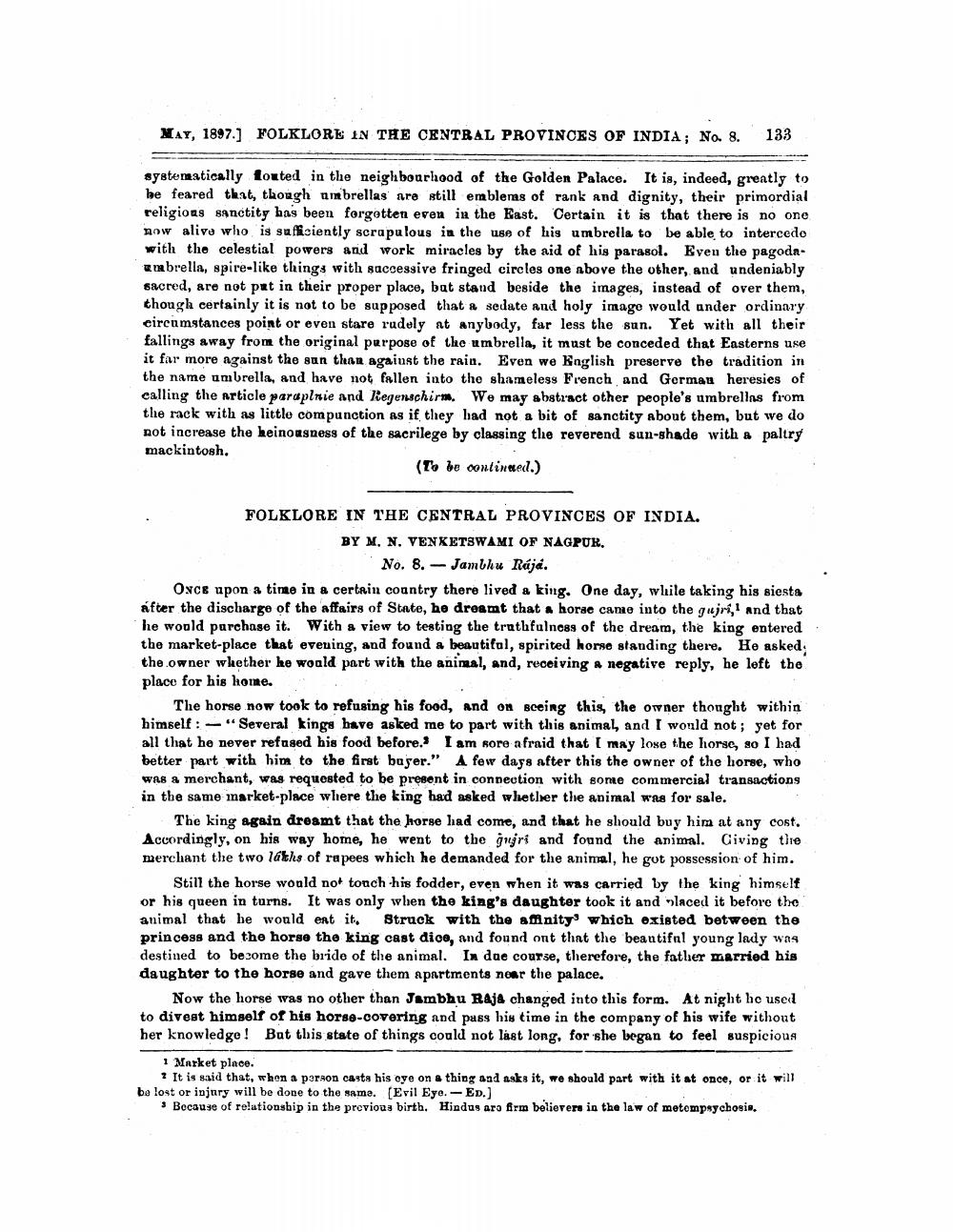________________
MAY, 1897.] FOLKLORE IN THE CENTRAL PROVINCES OF INDIA; No. 8.
133
systematically touted in the neighbourhood of the Golden Palace. It is, indeed, greatly to be feared that, though umbrellas' are still emblems of rank and dignity, their primordial religious sanctity has been forgotten even in the East. Certain it is that there is no one now alive who is suficiently scrapulous in the use of his umbrella to be able to intercedo with the celestial powers and work miracles by the aid of his parasol. Even the pagodaarbrella, spire-like things with successive fringed circles one above the other, and undeniably sacred, are not put in their proper place, bat stand beside the images, instead of over them, though certainly it is not to be supposed that a sedate and holy image would under ordinary circumstances point or even stare rudely at anybody, far less the sun. Yet with all their fallings away from the original perpose of the umbrella, it must be conceded that Easterns use it far more against the sun than against the rain. Even we English preserve the tradition in the name umbrella, and have not fallen into the shameless French and German heresies of calling the article paraplnie and Regenschirm. We may abstract other people's umbrellas from the rack with as little compunction as if they had not a bit of sanctity about them, but we do Rot increase the heinousness of the sacrilege by classing the reverend sun-shade with a paltry mackintosh
(To be continued.)
FOLKLORE IN THE CENTRAL PROVINCES OF INDIA.
BY M. N. VENKETSWAMI OF NAGPUR.
No. 8. - Jambku Rája. Once upon a time in a certain country there lived a king. One day, while taking his siesta after the discharge of the affairs of State, he dreamt that a horse came into the gujr, and that he would purchase it. With a view to testing the truthfulness of the dream, the king entered the market place that evening, and found a beautiful, spirited horse standing there. He asked, the owner whether he would part with the animal, and, receiving a negative reply, he left the place for his home.
The horse now took to refusing his food, and on sceing this, the owner thought within himself :-"Several kings have asked me to part with this animal, and I would not; yet for all that he never refused his food before. I am sore afraid that I may lose the horse, so I had better part with him to the first bager." A few days after this the owner of the horse, who was & merchant, was requested to be present in connection with some commercial transactions in the same market-place where the king had asked whether the animal was for sale.
The king again dreamt that the horse had come, and that he should buy him at any cost. Accordingly, on his way home, he went to the grgri and found the animal. Civing the merchant the two lakhs of rapees which he demanded for the animal, he got possession of him.
Still the horse would not touch his fodder, even when it was carried by the king himself or his queen in turns. It was only when the king's daughter took it and placed it before the animal that he would ent it. Struck with the amnity which existed between the princess and the horse the king cast dice, and found ont that the beautiful young lady was destined to become the bride of the animal. In due course, therefore, the father married his daughter to the horse and gave them apartments near the palace.
Now the horse was no other than Jambhu Rają changed into this form. At night ho used to divest himself of his horse-covering and pass his time in the company of his wife without her knowledge! But this state of things could not last long, for she began to feel suspicious
1 Market place.
? It is said that, when a poraon casts his oye on a thing and asks it, we should part with it at once, or it will be lost or injury will be done to the same. (Evil Eye.- ED.)
3 Because of relationship in the previous birth. Hindus ara firm believers in the law of metompsychosis.




